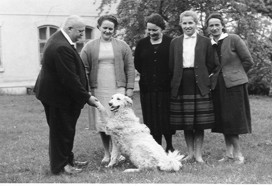
Anna is pictured here holding her son Antoni
with her husband and father behind her
Anna was born on Oct. 7, 1920, in Niwiska, Poland on the family farm. She was the oldest of Wladyslaw (Walter) Grabiec’s six children.
Anna was very close to her mother, Maria (Grabcow) and helped her with chores on the farm. Her father worked as a forester on the estate of Jan Hupka.
During WWII, many villagers in Niwiska were forced to work as slave labor, but Anna was allowed to tend to her elderly mother. The village priest, Father Kurek, petitioned the Nazis to allow this exemption.
The Hupka estate came under the control of the Nazis and became the foundation of a German farm, referred to as “Bauerskim” by the Polish population. Walter sought out an abandoned house with a small field near the village of Pustkow and received permission to live on it.
Anna was given a job in the kitchen for the laborers who built barracks for officers and German soldiers in the southern part of the camp.
Anna’s sister, Helena was forced to work in a laundry at a local prison camp. Another sister, Stanislawa, was forced to work as a domestic for a German businessman and his family who were recently brought to the area. She was placed on a train for Auschwitz but was rerouted to Germany where she was a prisoner laborer in factories. After the war, Stanislawa was repatriated to Sweden by the Red Cross and then came to America with her new husband who was a leader in the resistance in Poland.
There was a Jewish camp of forced laborers to the northeast. Soon, the camp housed Polish prisoners and many died of hunger and disease. The bodies were burned in two crematoria. Anna reported that the stench was formidable because the Nazis also used a flammable mixture to accelerate the burning.
Anna had promised not to be involved with the Polish underground and had to keep her covert activities a secret from her mother. She worked as a courier with the resistance forces that were very active in the region.
The villagers and prisoners were liberated in July 1944, and the family was allowed to return to Niwiska in early December. They started over with no material assets such as clothing or shoes. Their fields were empty, and the house was very run down.
After the war, Anna continued her education at a school in Niwiska. In September 1946 she joined a two-year preparatory course for the teaching profession. After that, she completed a two-year Pedagogical High School in Debica, took the maturity exam, and became a teacher in 1950.
Anna’s first job was at a school in the village of Przylek. The salary was meager, and she had to rely on the kindness of the parents at the school to get by. After one year, she was transferred to a school in Niwiska at the request of the headmaster, Antoni Vetch. He was the head of the school in the village of Cmolas and was a prominent member of the Polish resistance during the war.
Anna worked for twenty-eight years as a respected teacher in Niwiska. She loved the profession, her students, and the school but noted the teaching conditions were difficult during that time. During those early years, there was no running water or electricity and no bus service to Kolbuszowa. She reported that sometimes on her walk from Kolbuszowa to Niwiska, there was no one else on the road for the entire way.

Anna is on the far right
In 1954, Anna married Wladyslaw Grabiec* and two children followed. Antoni died within his first year of life and Maria, born on May 19, 1963, married Marek Rzemien. Anna enjoyed tending to her grandchildren after retirement in 1979 but continued part-time because of her love of teaching. She lived with her daughter Maria and her family until her death. Anna passed away on October 19, 2012, at age 93.
Anna received the distinguished Gold Cross of Merit because of her fervent lifelong endeavors, bravery, and service. The Gold Cross of Merit is the highest award given to civilians in Poland.
*Anna Grabiec’s father and husband were both named Wladyslaw (Walter) Grabiec.